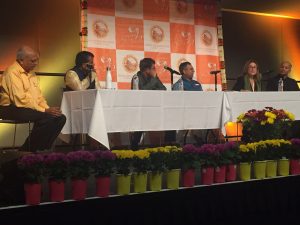I was an honorary panel member at the Third Annual Global Bhagavad-Gita Convention in San Jose this year. Our topic was societal well being.
A question was posed from an audience member. When is it appropriate to offer help to someone you see in need?
Though I’m quick to opinion it also takes me a bit of ruminating to run the gamut of possibilities that both a question and answer offer and another panelist answered as I was still considering more than my first thought which was a question,
Do they want help?
That was only the initial thought which lead me to two more questions.
Do you want to help?
Do you have the capacity to help?
The Bhagavad-Gita tells the story of a troubled Prince Arjuna who asks a trusted mentor, Krishna, for help. Krishna is a steady hand and one with authority and investment in the Prince meeting his destiny with integrity and a clear mind. He is the one best suited to help Arjuna through his struggle. The body of these 700 verses is Krishna convincing Arjuna of his destiny and duty.
Simply, Arjuna asked for help and Krishna was both interested in and capable of helping.
This is a great formula which I use myself on a regular basis when I find myself feeling guilty about not helping or frustrated that I can’t help or even confused about when it is appropriate to help. One doesn’t want to make others powerless by doing their work and more often, one doesn’t want to be the object of anger when trying to help where help is not wanted.
There are some additions to considering the question of when to help that isn’t as obvious in the Gita.
Sometimes people ask for help directly but often they ask for help indirectly. This takes intuition.
Sometimes they ask and you don’t want to help though you have the capacity. That is valid.
Sometimes they ask and you want to help but don’t have the capacity.
In these variables the answer is to send them to someone who does want to help and has the capacity.
We can accept that we are not all things to all men but that we are responsible to do the best we can.
In being catalysts we are part of the web. We are still part of a solution.
I recommend you go to the Gita formula first to clarify the answer to the question, Should I help?
The rest of it will fall into place.
